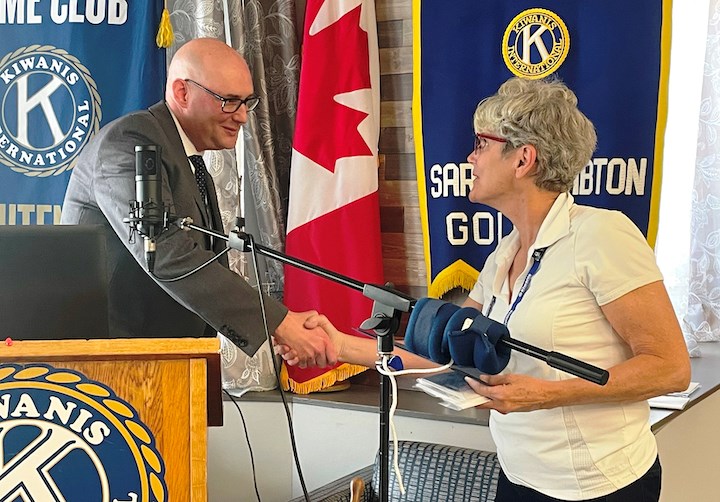Cathy Dobson
The Royal Canadian Mounted Police celebrates its 150th anniversary today at a time when recruiting new officers and staying ahead of major crime trends is increasingly difficult, says Matt Peggs, Acting Commanding Officer in Ontario and Chief Superintendent of Criminal Operations.
He was guest speaker at the Golden K Kiwanis Club meeting in Sarnia this morning, and paid tribute to the RCMP’s historical milestone and its ongoing presence in 150 communities across Canada.

Sarnia had a detachment for 99 years but it closed in 2019, a victim of “operational efficiencies,” Peggs said.
The local detachment was one of the original six in Ontario, with the others located at Haileybury, Sault St. Marie, Niagara Falls, Windsor and Fort Erie.
Local RCMP investigations tend to be related to the Bluewater Bridge border crossing and are now carried out by officers based in London and Windsor, said Peggs, who drove from London where the Ontario RCMP headquarters is located.
“Our job has changed so much in terms of where crime in located,” he said, explaining why the Sarnia detachment was closed. “Most of it is in the very big centres, so to have detachments in other places begins to be inefficient.”
The RCMP still has a presence in Sarnia-Lambton, he stressed. “We still do boat patrols in the area. We just don’t have people living here.
“We’re down here quite a bit, whether it’s on the water or whether it’s doing patrolling or responding at the bridge.”
Canada’s national police force was founded on May 23, 1873 as the Northwest Mounted Police. The name changed in 1904 to Royal Northwest Mounted Police and again, in 1920, to Royal Canadian Mounted Police.
Today, the RCMP has nearly 30,000 employees, including about 2,000 in Ontario, who focus on national security, transnational serious and organized crime, border integrity and Cybercrime, which includes Cyber-attacks against the Canadian government, Peggs said.
“Cybercrime is the new frontier of policing,” he said.
Addressing shifting types of crime requires the RCMP to continually modernize.
“We’re trying to ensure we keep up with crime trends,” he said
As the RCMP marks 150 years, hiring new recruits has never been more difficult, Peggs said, adding that it’s the same for all police organizations in 2023.
“It’s a demanding profession,” he said. “But we want to be an employer of choice for Canadians.
“We’re an iconic organization. We’re across the whole country and we can provide many opportunities for people.”
He pointed out that in his 23 years with the RCMP, he’s had 10 different jobs and worked in three different provinces and territories.
The job offers an opportunity for travel and to gain perspective on regional differences, he said.
Yet, there are not enough recruits.
Peggs said he believes that’s because the job has become more “complex” as police and policing issues are more in the public eye.
“It’s not an easy job, although it’s a very rewarding job,” he told The Journal. “If I had to do my career all over again, I would absolutely, but it’s challenging.”
Policing is a “wonderful” profession, but there seems to be a lack of respect for some of the laws (compared) to what there used to be.
“I think there are a lot of social issues, a lot of social disorder, and a lack of respect for the law, in my opinion,” he said.
The pandemic played a part in that, he added. “It exacerbated a lot of things.”
Nationwide, the RCMP has 134 working dog teams and 122 police service horses.
Its fabled Musical Ride is due to perform in Leamington Sept. 15 and 16, and in Essex Sept. 17.
KEY HISTORICAL DATES FOR THE RCMP
1887 - First Musical Ride performs;
1903 – Arctic Coast added;
1908 – Finger printing system approved;
1922 – Windsor becomes the first detachment with a car, a Model T Ford;
1932 – First air search in RCMP history;
1946 – First Marine Division in Ontario with boats at Windsor and Sarnia;
1975 – First all-female troop of officers graduated;
1977 – First Emergency Response Team to handle high-risk situations;
1991 – First use of DNA evidence in an investigation led to conviction of serial killer Allan Legere in New Brunswick;
1993 – J.C. Picard became the first self-identified Black male commissioned officer;
2006 – First female commissioner, Beverley Busson appointed;
2015 – First Cybercrime investigation team established;
2022 – RCMP riders led procession at Queen Elizabeth II funeral;
2023 – RCMP riders led procession for King Charles III’s coronation.
(Source: Ontario RCMP Acting Commander Chief Superintendent Matt Peggs)
